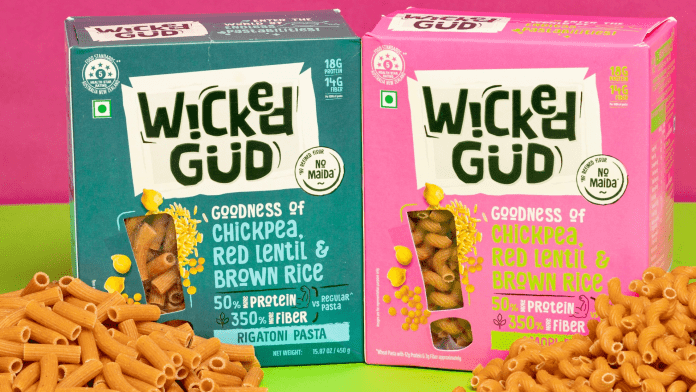WickedGud, a direct-to-consumer (D2C) startup specializing in food and snacks, has announced its ambitious goal of achieving a net revenue of INR 700 crore, along with an EBITDA of INR 100 crore, over the course of the next seven years.
The company noted that Indian consumers are now displaying heightened awareness regarding health, hygiene, sustainability, and ingredient scrutiny. This is coupled with a significant increase in the demand for naturally sourced, organic, and environmentally friendly fast-moving consumer goods (FMCG) products.
Bhuman Dani, Founder and CEO of WickedGud, said, “We have grown three times in revenues over the past four months and with a clear roadmap to achieve EBITDA positivity. Currently selling across all major e-commerce and quick-commerce platforms and in 400 retail stores, we plan to target 3000 retail outlets in the next 18 months, resulting in a six times revenue growth.”
The producer of noodles and pasta has expressed its intention not to focus solely on achieving substantial market share within a single category. Instead, the company aims to diversify its product portfolio across three to four prominent fast-moving consumer goods (FMCG) segments, aiming for a 2-3% share in each segment.
“We have created pasta and noodles out of dal, chawal, chana, atta, oats and jowar, so it’s significantly better in macronutrient profile when compared to incumbents,” added Dani.
The firm aims to secure INR 15 crore in funding, propelling them towards an annual recurring revenue of INR 60 crore, and ensuring a two-year operational runway. Notably, it has recently secured INR 2.25 crore from renowned actor, entrepreneur, and serial investor Shilpa Shetty, as well as an additional INR 2 crore from the financing platform GetVantage. As of now, the food company’s cumulative funding stands at approximately INR 15.6 crore.
Also Read: WickedGud secures $250,000 in growth funding led by GetVantage, accelerating expansion plans
“WickedGud has strong business fundamentals to scale aggressively. The plant-based food space is growing rapidly and with WickedGud’s 100% plant-based pasta, they have smartly created a niche in a fast-growing market,” said Bhavik Vasa, Founder and CEO, GetVantage adding that a report indicates the Asia-Pacific region to register the highest CAGR in the plant-based segment, at 6.3% between 2017 and 2025.
Over the past three years, there has been a notable surge in the proliferation of online-only brands within various new-age categories. These brands have been proactive in introducing innovative products that cater to specialized market gaps, strategically harnessing consumer data and insights. However, in response to this trend, traditional companies are taking steps to enter these emerging spaces or are opting to acquire smaller brands to secure their presence and relevance.
Nearly two years ago, Tata Consumer made a significant move by acquiring a complete 100% stake in Kottaram Agro Foods. This company is known for producing the Soulfull brand, which includes breakfast cereals and millet-based snacks. Interestingly, even competitors like Marico, ITC, and HUL have joined the trend of investing in direct-to-consumer (D2C) brands.
For instance, Marico took a considerable step by acquiring a 54% stake in HW Wellness Solutions. This particular company owns True Elements, a brand specializing in healthy breakfast options and snacks. Likewise, ITC directed its investment towards Sproutlife Foods (SFPL), the parent company of Yoga Bar. In a similar vein, Hindustan Unilever Limited (HUL) made strategic investments in Zywie Ventures, the company behind the plant-based supplement brand Oziva, and Nutritionalab, the entity responsible for the Wellbeing line of nutritional products.





